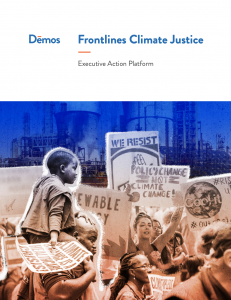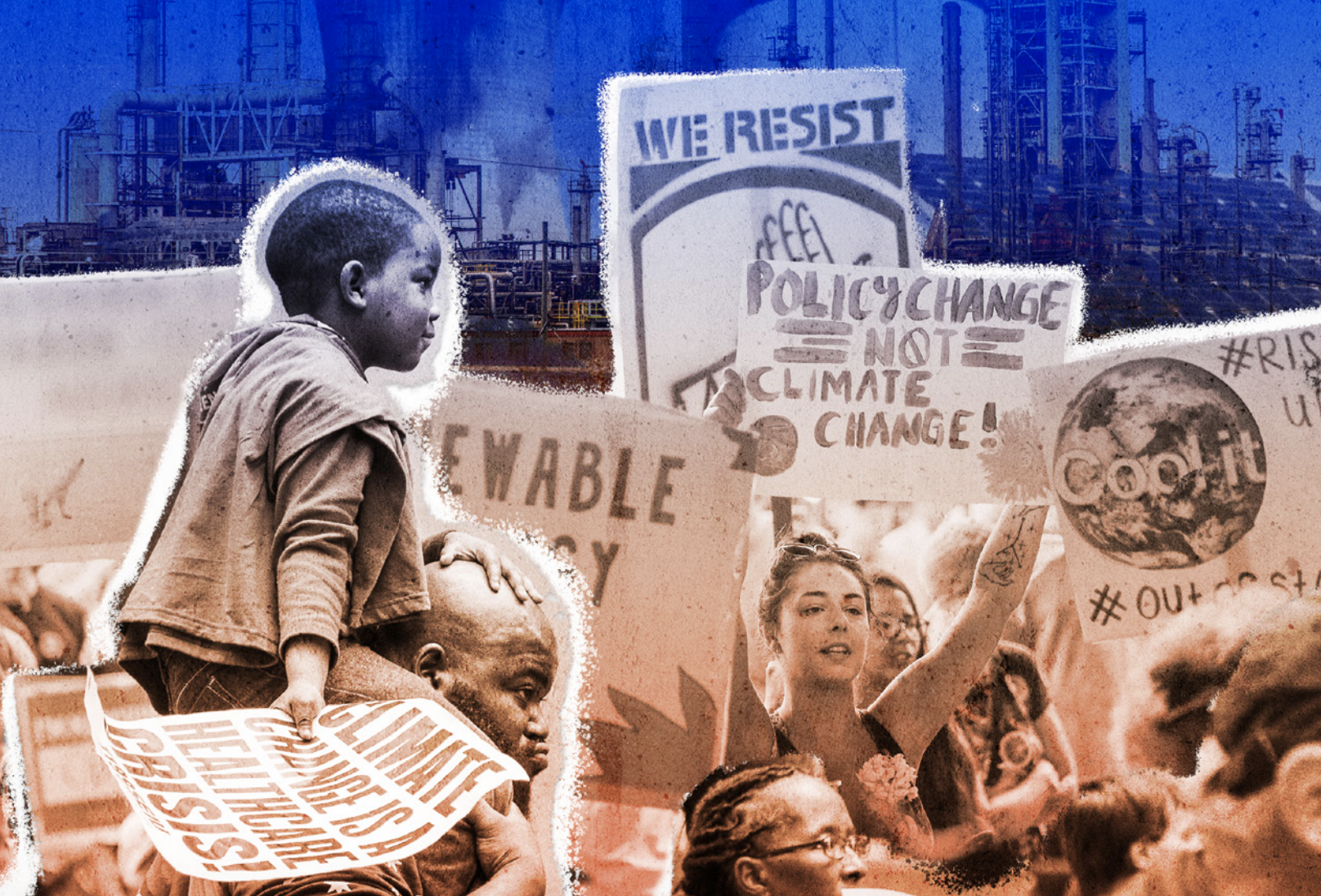
Initial Signatories: Center for Biological Diversity, Climate Justice Alliance, Democracy Collaborative, Dēmos, GreenFaith, Greenpeace USA, Hip Hop Caucus, Indigenous Environmental Network, Institute for Policy Studies Climate Policy Program, Maine People’s Alliance, Michigan Environmental Justice Coalition, MoveOn, National LGBTQ Task Force, New Economy Coalition, New Florida Majority, Oil Change U.S., People’s Action, Sunrise Movement, Working Families Party, 350.org
July 2020
As communities across the country, as well as countless people all over the world, face accelerating impacts and risks of climate change, federal, state, and local leadership in the United States is critically important for advancing immediate and aggressive climate action in public policy.
The science shows we no longer have the luxury to act incrementally. We must rapidly transform every sector of society if we are to limit global warming to 1.5 degrees Celsius. But urgent action on climate change cannot come at a price of expedience and further sacrifice for frontline communities. Frontline communities are primarily communities of color, indigenous communities, and struggling working-class communities most impacted by fossil fuel pollution and climate change—which are all the more vulnerable due to historic and continuing racism, segregation, and socioeconomic inequity.
In tackling the urgency of the climate crisis, prioritizing the most impacted communities for the protections and benefits of an economy-wide renewable energy transition is a moral imperative. This is, in large part, the meaning of a “just transition.” The economic transition we need to reverse the climate crisis must not leave behind impacted communities and workers. Racial and economic equity must be at the core of all climate solutions.
The executive branch can set the stage for a transformative climate justice agenda by taking immediate action at this intersection of climate, racial justice, and economic transformation. The Frontlines Climate Justice Executive Action Platform speaks to this opportunity by identifying regulatory rulemakings and other executive actions to advance an equitable climate agenda from day one. While major legislation in many areas will ultimately be needed to advance a bold federal agenda of climate action, this platform proposes a set of actions the executive branch can take without new legislation, major new appropriations, or other Congressional authority. However, many of the proposed executive actions can be harmonized with, be complementary to, or set a direction for statutory advancement of transformative climate action when that becomes possible.
Download the Policy Summary for a topline overview of this platform
Download the Policy Memorandum for full details on individual executive actions
This platform identifies actions in 4 basic categories that speak to the policy work and movement-building that frontline leaders in the climate movement have developed over many years, as they have forged a clear vision of equitable and resilient social and economic transformation:
- Environmental Justice: Protecting frontline communities from continuing harms of fossil fuel, industrial, and built environment pollution.
- Just Recovery: Ensuring just and equitable recovery from, and resiliency against, climate disasters.
- Climate Equity Accountability: Elevating equity and stakeholder decision-making in federal climate rules and programmatic investments.
- Energy Democracy: Remaking the monopoly fossil fuel energy system as a clean, renewably-sourced, and democratically-controlled commons.
In each of these areas, the platform presents a policy outline of possible rulemakings, executive orders, or other presidential actions that, taken together, aim to put frontline needs and priorities at the center of climate policy, including empowering grassroots stakeholders to be decision-makers in the process.
This platform builds on the hard-fought history of environmental justice advocacy that escalated in the 1980s, launched a principled national movement in 1991, and was formally recognized in federal policy in 1994 with President Clinton’s historic Executive Order 12898. Executive Order 12898 requires federal agencies to develop strategies for “achieving environmental justice,” but even by its own limited mandate, it has not been enforced, and frontline communities now face climate change impacts that only compound ongoing racial disparities in pollution exposure and fossil fuel harms.
Taken together, the actions recommended in this platform address continuing disparities, establish greater accountability for a just transition, and lay groundwork for systemic changes needed to end fossil fuel dependency and build a just and equitable renewable energy future. In these key respects, it is inspired by the principled vision put forward by the Equitable and Just National Climate Platform, and aligned with the Climate Justice Alliance’s Just Transition: A Framework for Change. It also respectfully acknowledges the place of Native leadership in a just transition, as formulated in the Indigenous Principles of a Just Transition. This platform also complements proposed executive actions in the Climate President Action Plan, including supply-side restrictions to limit fossil fuel extraction, economy-wide greenhouse gas (GHG) mitigation standards, and Department of Justice intervention to protect non-violent climate change activists from criminalization by states and localities, to pursue significant cases against environmental racism under civil rights laws, and to investigate and pursue, or otherwise support, civil and criminal lawsuits against fossil fuel companies. All of that and much more is needed, but the focus of this platform is specifically on the needs and priorities of frontline communities in the face of climate crisis.
In the broader landscape, the emerging paradigm of a Green New Deal captures the scale and urgency of the climate crisis. However, a primary — and science-driven — focus on aggressive GHG reductions is not inherently equitable for communities facing disproportionate local pollution, largely from the same facilities and sources driving the climate crisis. There are many reasons for this, including that the most polluted communities will tend to be “last in line” for GHG reductions, because these reductions are likely to be the most costly. Longstanding and worsening political power imbalances also often determine who will be protected by, and who will benefit from, any public policy, including climate policy and related investments.
The promise of climate policy for frontline communities lies in targeted policy design that prioritizes protections, direct emissions reductions, job creation and other economic benefits, and resiliency gains for the most impacted communities, including greater control of decision-making — all of which animates the executive action platform that follows. It also lies in addressing deeply interconnected crises of housing affordability, gentrifying economic development, and financial extraction of labor, community, and natural resources. Those challenges cannot be solved by the executive branch on its own and will require extensive state and local action, major federal legislation in some cases, and massive public investment through appropriations, bonding, and other means.
In contrast with the promise, the peril of climate policy lies in deferment of and underinvestment in equitable and transformative solutions, and elevation of false solutions that put markets, unproven technology, and, ultimately, private investors, in charge of the transition — not the most impacted communities and the most equitable solutions.
Together, this understanding of the promise and the peril of climate policy is the vision of frontline leaders working in the hardest-hit communities and regions, developed over many decades. This vision has been building from local action to regional and national networks and strategies, which have accelerated in the last several years. Many organizations representing frontline communities have led in this process. The Gulf South for a Green New Deal Policy Platform is one powerful example of a locally-driven and regional vision of climate justice for the most impacted communities.
Ultimately, winning a frontline climate action agenda starts with the vision of frontline leaders. Moving forward requires elevation of that leadership, grassroots power-building, and commitments of national allies and public officials to support the frontline vision and its policy components as a clear priority in the federal landscape in 2021 and beyond.
In the first 100 days of a new term, the executive branch could bring dramatic developments in federal climate policy. This executive action platform will help to ensure that, however bold in tackling climate change, federal climate policy is centered on advancing racial justice and ensuring a just and equitable economic transformation for the most impacted communities.
Click here to download the policy summary.
Click here to download the full policy memo.
Additional Signatories: Alianza for Progress, American Jewish World Service (AJWS), Association for the Advancement of Sustainability in Higher Education (AASHE), ATMOS Financial, Better Future Project, Binghamton Regional Sustainability Coalition, California Environmental Justice Alliance, Call to Action Colorado, Campaign for America’s Future, Catalyst Miami, Catholic Divestment Network, CatholicNetwork.US, Center for Economic Democracy, Center for Emergent Diplomacy, Center for International Environmental Law, Center for Story-based Strategy, Clean Energy Action, Climable.org, Climate Crisis Policy, Climate Finance Action, Climate Hawks Vote, Co-op Power, CODEPINK, Community Power, Cooperative Energy Futures, Data for Progress, Dayenu, Democrats of the Desert, Detroit Green Skills Alliance, Earth Care, Earth Day Initiative, Earth Ethics, East Michigan Environmental Action Council (EMEAC), Education, Economics, Environmental, Climate and Health Organization (EEECHO), Extinction Rebellion, Extinction Rebellion Coachella Valley, Fair World Project, Faithful America, Friends of the Earth U.S., Fund for Democratic Communities, Grassroots Global Justice Alliance, Green America, Green Education and Legal Fund GRID Alternatives, Gulf Coast Center for Law & Policy, in.site collaborative, Indivisible East Manatee, Interfaith Power & Light, International Association of World Peace Advocates, International Student Environmental Coalition, Just Community Energy Transition Project, KrowdX Inc., Les Jeunes Ambassadeurs de l’Environnement pour le Développement Durable, Local Clean Energy Alliance, Long Beach Alliance for Clean Energy, Manatee Clean Energy Alliance, Miami Climate Alliance, Mothers Out Front, Nature Conservation Advocates for Climate initiative (NCACI), NC Climate Justice Collective, No Kill Magazine, North Carolina Council of Churches, North Carolina Interfaith Power & Light, NYC Grassroots Alliance, Organizers in the Land of Enchantment (OLÉ), Our Climate, Partners for Dignity & Rights, Partnership for Policy Integrity, Partnership for Working Families, Peace Development Fund, People Power Solar Cooperative, Peoples Climate Movement — NY, PeoplesHub, Physicians for Social Responsibility Pennsylvania, Post Growth Institute, Power Shift Network, Progressive Sarasota (Florida), PUSH Buffalo, Race Forward, Rachel Carson Council, Rainforest Action Network, Rapid Shift, Renewable Energy Long Island, Resource Generation, Santa Cruz Climate Action Network, Sarasota Climate Change Meetup, Solstice Initiative, Inc., Southern Oregon Climate Action Now, Suncoast Climate Justice Coalition, Sustainable Economies Law Center, SustainUS, The CLEO Institute, The Climate Mobilization, The Climate Museum, The Leap, The River Project, The Solutions Project, TimeBanks USA, Unitarian Universalist Ministry for Earth, Unitarian Universalist Service Committee, UPROSE, US Partnership for Education for Sustainable Development, WildEarth Guardians, Women’s Earth and Climate Action Network (WECAN), Young Entertainment Activists, Youth United for Climate Crisis Action (YUCCA), 198 methods, 350 Butte County, 350 New Hampshire, 350 New Orleans, 350 Seattle, 350 Triangle

